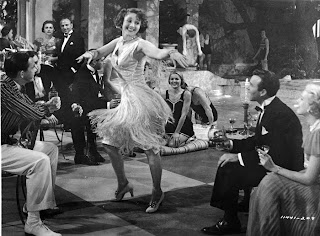 F. Scott Fitzgerald and his wife Zelda. Here they can be seen wearing fashionable clothes, which is important to note as they were the faces of the Jazz Age in both style and actions.
F. Scott Fitzgerald and his wife Zelda. Here they can be seen wearing fashionable clothes, which is important to note as they were the faces of the Jazz Age in both style and actions. Quote
“F. Scott Fitzgerald would soon be perceived as both the embodiment and the spokesperson of his generation” (34).
Connections
Zelda Fitzgerald was diagnosed with a type of scitzophrenia in her 30s, yet continued to create beautiful works of art such as dance, paintings, and essays. The relation of a famous creator with this disease can be connected to Jack Kerouac. Kerouac was a famous writer, most well known for his stream of consciousness style. Many may not have known that he had a form of schitziphrenia, yet despite his struggle, he continued to gain fame for his great works .
Fitzgerald’s alcoholism can be compared to many other famous writers. Some that top the list are James Joyce, William Faulkner, and Truman Capote. However, something interesting to note was that Ernest Hemingway, a friend of Fitzgerald’s, was another alcoholic writer.
I can also connect Fitzgerald to all of his novels and short stories. Fitzgerald took heavily from his own life when creating his stories and charcters. He even went so far as to claim creative ownership of his and Zelda’s life together because she started writing about their life as well. One great example of Fitzfgerald’s influenced writing was his last finished novel, Tender is the Night, which centers on a doctor and his schitzophrenic wife (based on Zelda). He falls in love with a young actress (based on Lois Moran, although in real life nothing ever happened between the two). Although none of the party incidents actually happened to Fitzgerald and his wife, the two did lead a similar life to those of the main character in the first section of the novel (in which the group always ends up staying out all night embarking on crazy adventures and parties). Many of the other characters are based on people who were influential to Fitzgerald’s life.
Questions
1. Was Zelda’s mental illness hereditary (her older brother killed himself, but that could have just been from being in the war)?
2. Why did Hemingway have such a strong sense of condescension toward Fitzgerald?
3. Is it legal to publish someone’s work after they died (it must have been because that’s what Max Perkins did after Fitzgerald’s death, but that just seems so wrong to make a dime off his death)?
4. How in the hell did Scottie turn out so well (her parents were sooooo screwed up)?
5. Why did Scott continue to take Zelda on trips even though they no longer loved each other (plus, he definitely should have been using that money toward paying off his many debts, or paying for Scottie’s tuition so he wouldn’t have to borrow so much)?
Reflection
I usually don’t like biographies as they bore me with their plethora of uninteresting information; however this one was rather interesting. I don’t think it was necessarily the writing, although the writing was fine, but perhaps just that Fitzgerald was an interesting man. At times you just wanted to slap some sense into him (like whenever he started binging on alcohol), but overall, you genuinely felt for him whenever things turned out poorly for him. One part of his life in which my heart particularly went out to him was when he went to see a play of a short story he wrote. He was really excited, having hoped that this particularly story would be adapted for the stage. He and Zelda showed up to a sparsely attended student production. Nonetheless, not to discourage any of the actors who so filled his heart, he was extremely polite the whole time, clapping loudly at every scene and going backstage afterward to talk with the actors. However, in the car on the way back to his home, Fitzgerald sat quietly. I think this except is a really great depiction of Fitzgerald, because he tried so hard and was often let down or treated poorly, and although he had his fair share of bad decisions, ultimately, he was just an excited little boy trying to make a name for himself. (At least, that’s the way I felt toward him while reading thi biography).

